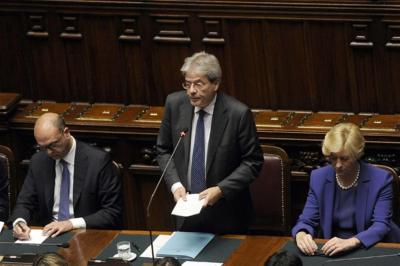Gentiloni wins both confidence votes in time for Brussels

ROME -- New Italian Prime Minister Paolo Gentiloni's government was put together in record time -- easily winning votes of confidence in the Senate and Chamber of Deputies -- so that the premier could attend a Brussels EU summit Thursday in the fullness of his powers.
Gentiloni attended his first EU summit as Prime Minister in Brussels' Albert Hall Theatre Thursday, for European Socialist leaders, in which he focused primarily on the question of immigration, hugely pertinent to Italy.
New PM Paolo Gentiloni won the Senate's confidence vote Wednesday with 169 votes in favour, and 99 against, after also smashing the vote of confidence in the Chamber of Deputies, the lower House, with 368 votes in his favour and 105 against him.
The Italian premier, in his speech at the Chamber of Deputies Tuesday in Palazzo Montecitorio, talked about a government “of responsibility” that will last “up until the parliament’s confidence in him lasts.”
He claimed that the continuity with the Renzi government -- that which many consider “a limiting factor” -- is actually a strong point,
The PM designate stressed that there are two particular themes which he intends to put more work into -- support for the middle classes in financial trouble, and the south of Italy.
However, within the Chamber, there were protests from the opposition parites, in particular the far-right Lega Nord politicians, some of whom even brought banners into the Chamber -- one, for example, reading “Sovereignty belongs to the people,” and another reading "A vote now!"
The whole designated section for the populist Five Star Movement within the Chamber was left totally empty, as none bothered to turn up to Gentiloni's speech.
Near the end of his speech, Gentiloni targeted the opposition by saying that “politics is debate, not hate. Whoever represents citizens should not spread fear. We should end the unstoppable escalation into verbal violence in our political debates. Parliament is not a social network.”
nkd


